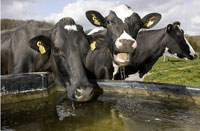Watchdog leaves farmers crying over cloned milk

A pioneering dairy farmer says his herd faces an uncertain future after being engulfed in a storm over meat and milk from the offspring of cloned livestock.
Scottish milk producer Steven Innes has been left in limbo after breeding almost 100 cows using two bulls imported as embryos from a prize-winning American dairy cow that had been cloned in Pennsylvania.
The animals were intended as replacements for Newmeadow Holsteins, the herd Mr Innes runs with his father Callum at Drumduan Farm, Nairn, in the Scottish Highlands. But they may now have to be culled.
The European Food Safety Authority says there is no clear evidence to suggest any difference between food products from clones or their offspring compared to products from conventionally bred animals.
But the UK Food Standards Agency considers the offspring of cloned animals to be “novel foods” and insists that special permission must be obtained before their meat and milk can be sold for human consumption.
“If we intend to do anything with them, then it looks like that is what we’ll need to do,” Mr Innes told Farmers Weekly. “But we’re not able to make any decisions until we get some proper answers.”
Even if a novel food application is submitted, there is no guarantee it would be granted. And any consumer backlash following tabloid headlines this week may mean there is no public appetite for clone-derived meat and milk.
Confusion over the legality of clone-derived products only emerged after an unnamed British dairy farmer told an American newspaper he was producing milk from the offspring of a cloned cow.
There is no suggestion that farmer was Mr Innes. But, having bred similar animals in good faith, he may now have to look elsewhere for 96 replacements to maintain milk output on his farm, which recently expanded to 1200 cows.
“The situation has only just come to light and we just want it sorting out,” said Mr Innes. “We’re not blaming anybody at all but we need some clarification over the rules and their interpretation.”
The Food Standards Agency insists its interpretation is correct – despite admitting there are no food safety concerns surrounding the consumption of animal products from healthy clones or their offspring.
“It is the responsibility of food business operators to ensure food that they place on the market is in compliance with the law,” said an agency statement. Failure to comply could result in a penalty of up to £5000.
Both the bulls used by Mr Innes have now been slaughtered. The first, Dundee Paratrooper, was slaughtered last year and ended up in the food chain, probably as a pie or burger. The second, Dundee Perfect, was incinerated last week.
Simon Gee, from breed society Holstein UK, said he was surprised the Food Standards Agency had taken so long to catch up with developments in animal breeding. “Strictly speaking, the law has been broken,” he said.
But the future of the 96 animals remained far from clear, Mr Gee added. “We would certainly like the issue clarified so our members can make informed decisions about future breeding programmes.”
In the end, though, the consumer will decide. Dairy companies will only put products onto the market that have full consumer acceptance in all aspects, said Jim Begg, of the industry body Dairy UK.
“This will ultimately drive any decision by milk processors to allow milk from progeny of cloned cows onto the market. And this will only happen after a full debate on the novel foods process.”
Read more on this story
• Cloning investigation finds second bull in food chain• Clone-derived meat has entered food chain – FSA
• FW’s bid to bring balance to cloning debate
• Food watchdog: No risk from ‘cloned milk’
• Milk from cloned cow offspring ‘went down the drain’
• No risk from ‘cloned milk’, claims industry
• Milk from cloned cow’s offspring ‘on sale in Britain’
